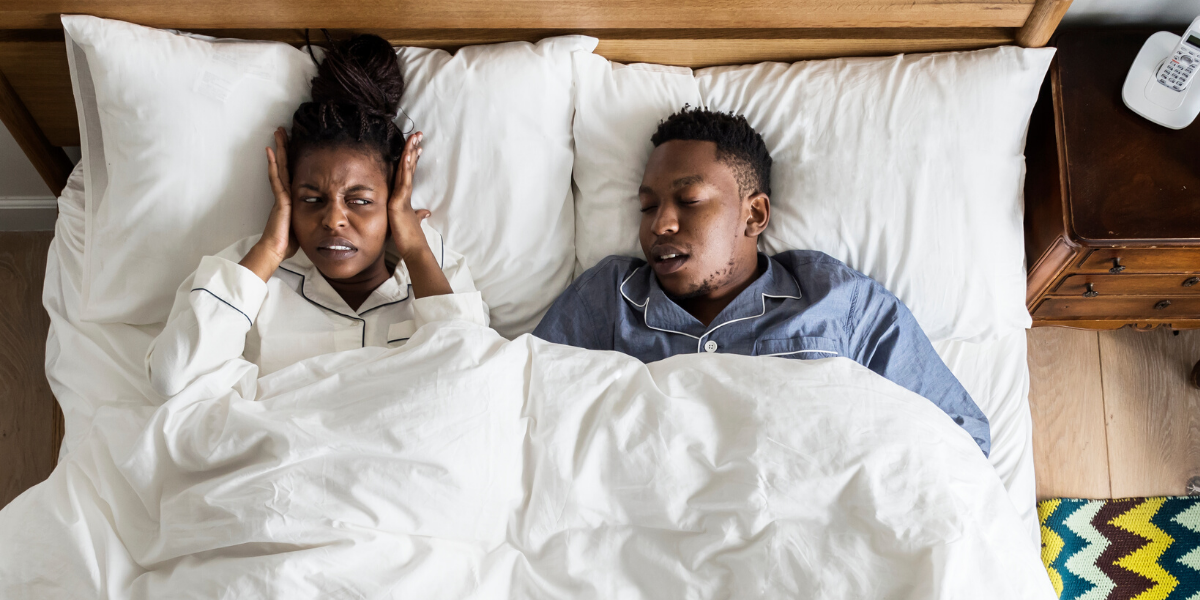Lately, you’ve been feeling alone at night. That’s because your spouse went to sleep in the guest bedroom, because you snore too loudly. You tell him or her that they’re mistaken. That’s when they record you without your knowledge, with an app designed just for this purpose that they put on your phone. One morning, fed up with you (even the neighbours can hear you snore!), your spouse plays you back this recording so that you finally understand why their eyes have such enormous dark circles.
That’s when your mind gets blown by how much you sound like the T-Rex in Jurassic Park. You look up how to stop snoring on the web, and you end up here, on our complete guide about the subject. Welcome!
Snores: the root of the problem!
Snoring has a very simple cause: it comes from the narrowing of your airway at the back of your throat! The mechanism that causes this is what’s more complex. You’re not the only one to relax and sleep in the arms of Morpheus: your soft palate, uvula and tongue also all relax, and so take up more space. And in some people, these parts of the mouth are larger, and so obstruct the respiratory tract. When you inhale, the organs start to vibrate with the air coming in. That’s what causes snoring!
In matters of snorers, no discrimination, just different proportions! So, 45% of adults occasionally snore, while 25% do so regularly. 10% of children also snore.
Varied and various factors can lead you to snore!
Snorers of all kinds, don’t worry, you’re not the victims of a curse. You just suffer from one or several factors. Since really, many causes can lead to snoring. Among these, there are:
- An excess of weight that can lead to a narrowing of the airways.
- Larger tonsils.
- Any congestion (colds, allergies, etc.).
- Alcohol.
- Smoking, which can irritate the respiratory tract.
- Taking certain drugs just before going to bed, like sedatives or antihistamines, that slacken the muscles a bit too much.
- Aging: the older we are, the more our tissues loosen up.
- Gender: men snore more than members of the opposite sex.
- Sleep position: if you sleep on your back, you’re more likely to snore!
Snoring is benign, but in some cases, a sign of sleep apnea!

Fortunately, in many cases, snoring has no consequence on your health, despite being irritating for your bed partner. But in some cases, it can be a sign that the snorer has sleep apnea, and that’s more complicated (see our guide about “how to choose the right pillow against sleep apnea”). In that situation, you’ll feel fatigue when you’re awake, even somnolence, but also bad oxygenation which, on the long term, can lead to cardiac issues, hypertension, and even heart attacks and/or strokes. Snoring is serious, and not just for your bed partner!
How to stop snoring?
This question is quite simple, but there are a multitude of answers to it, starting with changes in your health practices.
Avoiding alcohol, especially in the evening, avoiding sedatives and sleeping pills, losing weight with a more balanced diet and by exercising, taking car of your cold, or using an air humidifier: the solutions to try are numerous.
You can also try to sleep on your side to free your airways. This is however easier said than done: you might have to resort to positional therapy to condition yourself to sleep on the side. For this purpose, body pillows that take up the whole length of the bed can help you sleep better in this position. More generally, any foam pillow like the Polysleep pillow is recommended to prevent snoring, as well as a mattress that provides optimal support.
If that doesn’t work, you can try your luck with some natural products, among others:
- Ginger infusions, that increase the production of saliva.
- Peppermint in the form of essential oil to spray on your pillow: it causes your respiratory tract to open wider, and so makes it easier for air to pass.
- Fenugreek infusions, perfect as a decongestant.
- Poultices of clay, that have great sinus decongesting power.
If your snoring is a symptom of sleep apnea, you’ll probably have to consult. It’s a problem that can have grave consequences on the long term, and that requires your full attention.
Conclusion: Snoring is irritating but not serious, and there are solutions!
Snoring is not dangerous for your health, unless your partner gets the urge to hit you because they can’t sleep! In itself, snoring is a slackening of the tongue, the soft palate and the uvula, which take more space during sleep. In some cases, theses larger organs vibrate when you inhale, resulting in snoring!
Snoring affects people of all ages, and some factors can cause it or make it worse:
- Excess weight and obesity.
- Larger tonsils.
- Illnesses and allergies.
- Alcohol, some drugs, tobacco.
- Age and gender.
- Sleeping position.
But there is hope, you can cure your snoring by:
- Changing your health practices (i.e. losing weight with a more balanced diet and by exercising, no alcohol nor sedatives).
- Sleeping on your side, with the appropriate pillow and mattress.
- Taking or using certain natural products (ginger, peppermint, fenugreek, clay paste poultices).
- Using a continuous positive airway pressure device, that will allow you to reduce your episodes of sleep apnea if you have them.
Si vous avez aimé notre article de blog, n'oubliez pas de Partager le avec vos amis en cliquant sur le bouton ci- dessous !










